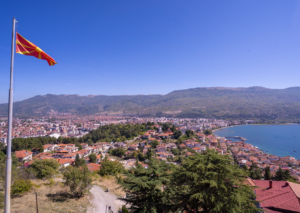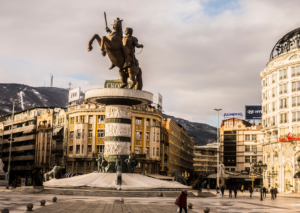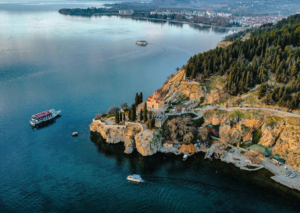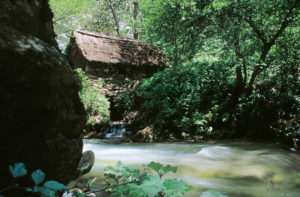Receive our newsletter
Your e-mail address is only used to send you our newsletter and information about the activities of Strasbourg Europe. You can always use the unsubscribe link included in the newsletter.

From the end of the Middle Ages, as with the rest of the Balkans, Macedonia was under the domination of the Ottoman Empire. However, due to rising nationalism during the 19th century, the Ottoman Empire was unable to maintain control of the region, which later led to the disintegration of the Empire.
 A third of the total population live in Skopje, the capital and the largest city of the Republic of Macedonia. Because of its status, the bulk of administrative, political, economic, and cultural activities of Macedonia happen here. Located alongside the biggest river in Macedonia, Vardar, the city is surrounded by several mountain ranges. There are plenty of cultural treasures : the Cathedral of St. Clement; the “kale” built in the eleventh century when Macedonia was passing into the hands of Byzantium, Bulgaria and Serbia; the fortress of Skopje; the Museum of Contemporary Art, the Mustafa Pasha mosque built in 1492; and of course, the famous bazaar. Today. the city is still deeply marked by the earthquake of 1963, which destroyed almost the entire city and many ancient monuments.
A third of the total population live in Skopje, the capital and the largest city of the Republic of Macedonia. Because of its status, the bulk of administrative, political, economic, and cultural activities of Macedonia happen here. Located alongside the biggest river in Macedonia, Vardar, the city is surrounded by several mountain ranges. There are plenty of cultural treasures : the Cathedral of St. Clement; the “kale” built in the eleventh century when Macedonia was passing into the hands of Byzantium, Bulgaria and Serbia; the fortress of Skopje; the Museum of Contemporary Art, the Mustafa Pasha mosque built in 1492; and of course, the famous bazaar. Today. the city is still deeply marked by the earthquake of 1963, which destroyed almost the entire city and many ancient monuments.
Sommerfestival von Ohrid, Welterbestadt
 Situated on the shores of Lake Ohrid, the town of Ohrid is one of the oldest human settlements in Europe. Built mainly between the 7th and 19th centuries, it has the oldest Slav monastery (St Pantelejmon) and more than 800 Byzantine-style icons dating from the 11th to the end of the 14th century. After the collection at the Tretiakov Gallery in Moscow, this collection is considered to be the most important collection of icons in the world.
Situated on the shores of Lake Ohrid, the town of Ohrid is one of the oldest human settlements in Europe. Built mainly between the 7th and 19th centuries, it has the oldest Slav monastery (St Pantelejmon) and more than 800 Byzantine-style icons dating from the 11th to the end of the 14th century. After the collection at the Tretiakov Gallery in Moscow, this collection is considered to be the most important collection of icons in the world.
The region of Ohrid is on the World Heritage List of UNESCO because of the presence of numerous archaeological sites dating back to the Neolithic, Bronze and the Hellenistic periods. Moreover, the wealth of the country led Ohrid to be placed on the World Heritage List in 1979.
All over a name…
 The dispute over the official name of Macedonia dates back to 1991, when it proclaimed its independence from Yugoslavia. Greece feels that Macedonia is the birthplace and homeland of Alexander the Great. The Greek government alleges that the disputed territory was not “Macedonia” before WWII, but Vardarska. Thus, Greece considers the name Republic of Macedonia as a territorial demand on their northern province of the country. Greece also holds the position that a name change could greatly dismantle the already volatile region.
The dispute over the official name of Macedonia dates back to 1991, when it proclaimed its independence from Yugoslavia. Greece feels that Macedonia is the birthplace and homeland of Alexander the Great. The Greek government alleges that the disputed territory was not “Macedonia” before WWII, but Vardarska. Thus, Greece considers the name Republic of Macedonia as a territorial demand on their northern province of the country. Greece also holds the position that a name change could greatly dismantle the already volatile region.
Picture: Old Wheat Mill, village of Papradiste, Mount Babuna
© Macedonian Minister of Foreign Affairs, Director of Public Diplomacy
Your e-mail address is only used to send you our newsletter and information about the activities of Strasbourg Europe. You can always use the unsubscribe link included in the newsletter.
Information Center
on the European Institutions (CIIE)
Europe Direct Information Center
All rights reserved to the CIIE
Non-profit organization
Mailing address
1 allée Kastner
67000 Strasbourg
France
Visitors entrance
8 rue Boecklin
67000 Strasbourg
France
To provide the best experiences, we use technologies such as cookies to store and/or access device information. Consenting to these technologies will allow us to process data such as browsing behavior or unique IDs on this site. Failure to consent or withdrawing consent may adversely affect certain features and functions.
Europe Direct network
The CIIE team
Contact information and opening hours
Lieu d’Europe
The CIIE offices
Contact us
CIIE’s Documentation Centre & Publications
School presentations & Activities
Borrowing of learning material
Activities for the general public
Institutions of the European Union in Strasbourg
Institutions Under the Authority of the Council of Europe
Other European Organisations in Strasbourg
Sessions of the European institutions in Strasbourg
Visiting the institutions
Map of the European district of Strasbourg
Institutions in Strasbourg in photos
Discover artistic Europe
National holidays of the member states of the Council of Europe